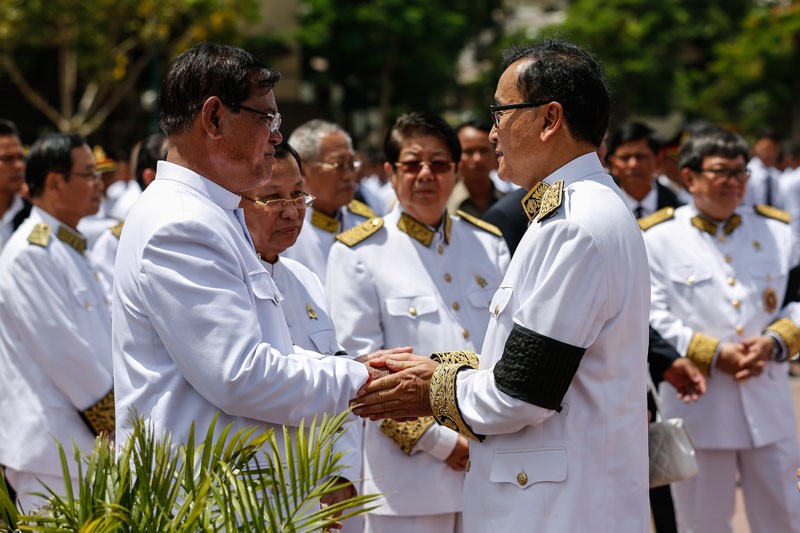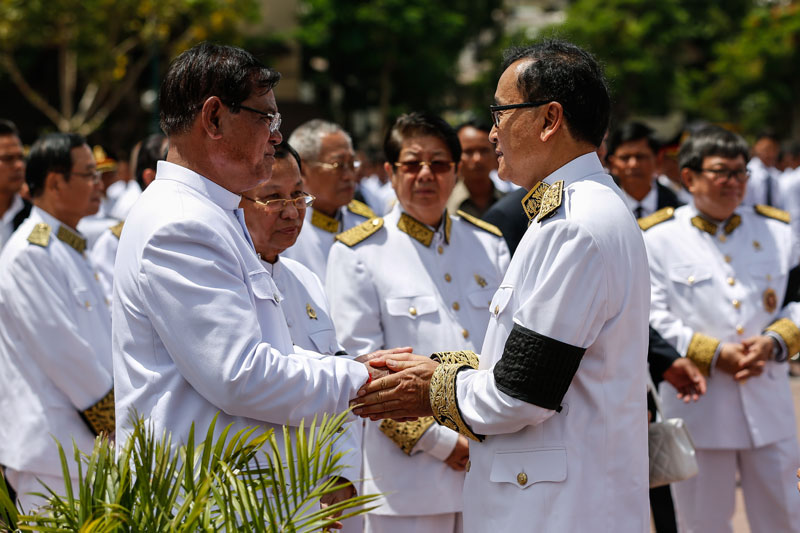Speculating on the internal dynamics of the CPP has long been the bread and butter of Cambodian political observers, with theories about divisions in the party proving only less popular among senior leaders than criticism about rights abuses.
Such tea-leaf reading has led to a type of Kremlinology that holds Prime Minister Hun Sen and his authoritarian cult of personality against seemingly more moderate groups close to Interior Minister Sar Kheng and Senate President Say Chhum, both vice presidents of the party.

This impression was only strengthened when Mr. Kheng last month expressed what seemed to be dissent against the blizzard of arrests amid the government’s paranoia about a “color revolution” breaking out.
“I want to clarify that according to my understanding, the color revolution could occur because of inactiveness in our management,” Mr. Kheng said before an audience of national police officials on May 16.
“If our management can allow them to live with happiness together, there is no reason for a color revolution to happen,” he added, expressing a point repeatedly stressed by opposition parties over the years.
“He’s a reasonable person, I think,” said senior CNRP lawmaker Son Chhay the next day, comparing Mr. Kheng to other senior leaders in the CPP who were “more about pointing fingers at the public rather than recognizing their own responsibilities.”
Conjecture of divergent views within the ruling party only grew when Interior Ministry spokesman Khieu Sopheak said last week that police may ignore any arrest warrants issued for deputy opposition leader Kem Sokha, even as the government seemingly pursues his jailing.
“According to the law, if we have a warrant from the courts to arrest, the competent authorities have to implement the warrant,” General Sopheak said in an interview with Vayo FM when asked about Mr. Sokha, who stands provisionally charged with failing to appear in court.
“But we think that if implementing this arrest warrant will cause blood to flow, clashes or acts of violence, I think the authorities will think—will not implement it.”
The open dissent from senior Interior Ministry officials could stem from their concern about the practicality of so many critics being arrested at once, Koul Panha, executive director of the Committee for Free and Fair Elections (Comfrel), said on Sunday.
The arrests of CPP critics—more than 20 have been jailed in the past year—have been driven in large part by officials close to Mr. Hun Sen, including former advisor and current Anti-Corruption Unit Chairman Om Yentieng, who last month even foreshadowed the way the government would seek to arrest Mr. Sokha.
“It may be that the Ministry of Interior has their own priorities,” Mr. Panha said. “They set some issues as higher priority than targeting opposition leaders, and their understanding may be deeper than some other top officials regarding why people frequently protest.”
“They may see that the response from the authorities is not proportional to what the people have been doing. It may be a kind of feedback to the top of the government to define the root causes of the problems and to engage the Ministry of Interior more,” he added.
“It’s been so fast, the reaction of the government,” Mr. Panha said, “and maybe there’s not been so much consultation before the implementation.”
Such was the complaint last month of former CPP Senator Chhang Song, who linked the chaos to the absence of late CPP President Chea Sim—Mr. Kheng’s brother-in-law—who died a year ago on Wednesday and had long been Mr. Hun Sen’s main rival in the party.
“Frankly, I don’t know who is the CPP’s brain nowadays since the death of Chea Sim,” said Mr. Song at the time, lamenting the apparent failure of anyone in ruling party to speak out against the chaos.
Sophal Ear, author of “Aid Dependence in Cambodia: How Foreign Assistance Undermines Democracy” and an associate professor at Occidental College in Los Angeles, said it was clear Gen. Sopheak and Mr. Kheng’s comments were acts of public dissent.
“The comments are not concordant with the party line, that’s for sure, and it is clear that it’s members of the late Chea Sim’s faction, but it’s not like we have not seen this before either,” Mr. Ear wrote in an email on Sunday.
“I’m not convinced that there’s a real burning desire to stand up to injustice. Just plain old realization that this might not make the most sense,” he added, explaining the main motivation was likely just to cool things down.
“We all know the more this happens, the more it will drive voters into the arms of the opposition. And yes, there’s good cop, bad cop strategy too.”
This view was shared by Kem Ley, a political commentator who heads the Khmer for Khmer grassroots advocacy group. He said that while it was positive that Mr. Kheng and Gen. Sopheak were speaking out, he did not believe they had gone rogue.
At the end of the day, he said, the CPP was a cohesive party that had, since the late 1980s, shown an ability to stick together and follow Mr. Hun Sen’s leadership.
“It’s a good sign for easing the tensions. The statements from Khieu Sopheak and Sar Kheng show they realize the roots and underlying causes of revolutions, and the root cause does not come from the people, it comes from a bad political culture,” Mr. Ley said.
“But it’s still centralized decision making. It’s all directed by the author. They just play the parts that are written, and this is their role. In one game, there are many actors—good actors, bad actors—and the players play the roles, but they all are reading the script.”
CPP spokesman Sok Eysan said differences in opinion between party leaders were often overblown, with political analysts taking “small issues” and then letting their imaginations run wild.
“The analyzers could not know what is in the minds of both the samdechs,” Mr. Eysan said, using the rare honorific shared by Mr. Hun Sen and Mr. Kheng—as well as Mr. Chhum, National Assembly Heng Samrin and Chea Sim before his death.
“They’ve raised [the idea of CPP factions] since after the national election in 1993. You can see until now that the CPP has not split up. It’s been 25 years already. Has it split up like they said?” he asked.
“Since the past, people have said ‘This is Samdech Hun Sen’s bloc, this is Samdech Chea Sim’s bloc, this is Samdech Heng Samrin’s bloc.’ But in fact, the samdechs often eat together.”
Either way, the comments from the Interior Ministry serve as a reminder that Mr. Hun Sen—for all his personalized style—does not rule alone, said Mr. Panha of Comfrel.
“It is a strength for any party to have some differences,” he said. “It cannot all just be at the top.”
(Additional reporting by Ben Sokhean)




